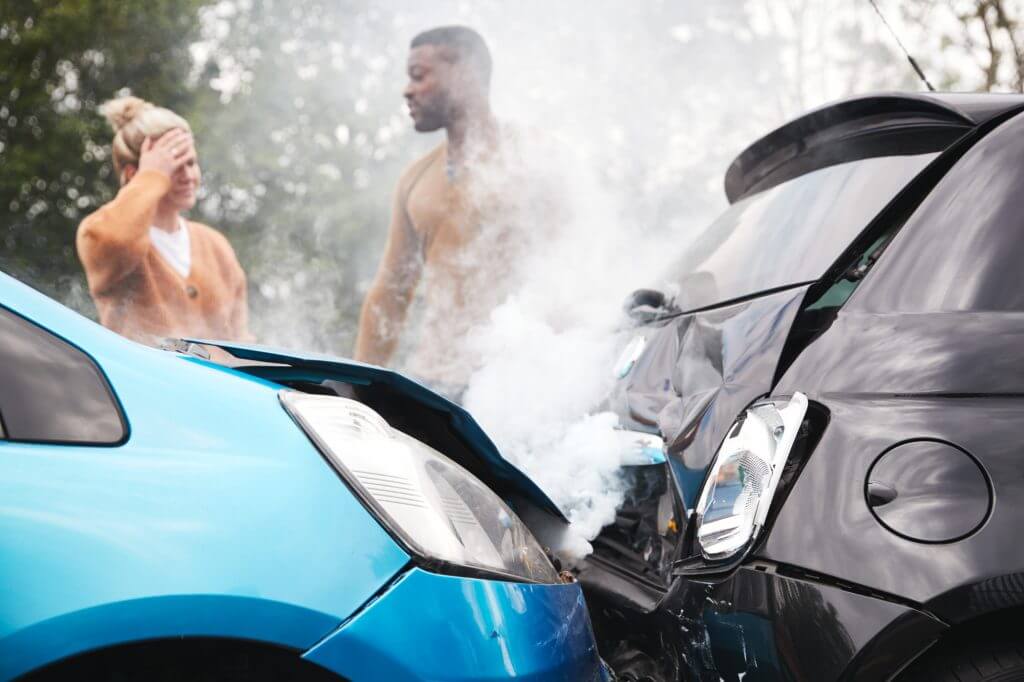What To Do After A Car Accident Checklist
Call (800) 641-7488 to speak with a live auto insurance agent.

What To Do After A Car Accident Checklist
Being involved in an auto accident can be a frightening and stressful situation. And if you want to be prepared in case the worst happens, you need this what to do after a car accident checklist. Let us help take the guesswork out of figuring out what to do to best protect yourself.
Anyone that’s been involved in a car accident knows that it’s the moments after a collision that can be the most chaotic. You’re filled with shock and fear which can completely overshadow logic and good judgment. This, in turn, makes things harder for you to act appropriately.
Lucky for you, our guide will tell you just the right steps to take after an accident and can help ensure that you make the best decisions to get back on track.
Check If You Have Any Potential Injuries
Right after an auto accident, you may feel disheveled and disoriented. Something shocking and unexpected has happened so it’s easy to feel lost and overwhelmed. But before you start moving around, looking for answers, check yourself for any potential injuries first.
You should try limiting your movement when searching for injuries since serious injuries aren’t always ones you’ll immediately feel or recognize. If you find that you are injured, it’s better to remain in place until help reaches your location. If possible, contact 911 or ask someone nearby to call emergency services for you instead.
Check If Your Passengers Are Okay
In the event that you’re traveling with others, there’s a chance they will also know what to do when you get in a car accident. They should be checking themselves for potential injuries as well and minimizing their movements. If you aren’t injured, you can serve as an aide to your passengers and check if they are Okay.
If someone in your vehicle has gotten injured, call 911 or ask someone else to call for you immediately.
Relocate To A Safer Area
One of the next most important steps to take after a car accident is moving to a sidewalk or the side of the road. This is assuming you are not seriously injured. Moving off to a safer area while you wait for assistance helps prevent any further accidents from happening.
Staying in your vehicle can be very dangerous, especially if traffic is still moving all around you. There are certain cities and states that require you to move your vehicle from the road if possible. There are also others that prefer if you leave the scene so that law enforcement can gather a full perspective of the accident.
Do Not Admit To Fault
If this is your first car accident, you may not know this, but you should not admit to fault. Once the police arrive on the scene, they typically speak to each person at the site of the accident to piece together what may have caused it. Even if you think you are responsible for the auto accident, it’s important that you don’t admit fault.
There could be various circumstances that could have contributed to the accident that you were not aware of. Those same circumstances could have been why you reacted a certain way, which might make you think you were at fault. However, it is not your job to figure out who is at fault — the law enforcement on the scene will find out who was the cause of the accident.
Write Down Your Side Of The Story
While the police will do their part with documenting their observations, you should also write down your own version of what happened. You should write down your thoughts as soon as possible after the auto accident so that you capture the important details. Since these accidents can be so traumatic and stressful, you could easily forget important information that may help your side of the story.
You should write down names, phone numbers, addresses, make, model and color of the vehicles involved. Document what you were doing before the impact as well as any other small details. Even if you aren’t sure if something is important, write it down anyway — some details could easily trigger other information you would’ve otherwise forgotten.
Avoid Too Much Conversation With The Other Party
It’s genuine to want to check on the other people involved in the accident, however, you shouldn’t speak to each other about the accident. This could leave you vulnerable to admitting fault or disclosing information to the other party that might encourage them to use those details against you. You should exchange contact information such as insurance cards, but leave the rest of the talking to the law enforcement on the scene.
Take Photos Of The Accident
Use your camera or smartphone to take pictures of the accident scene and any injuries you or your passengers sustain. Be sure to highlight different angles of the scene that reveals the damage to any vehicles involved. It’s also a good idea to get a photo of the other car’s license plate so you can use it for identification purposes.
Contact Your Insurance Company As Soon As Possible
You should contact your insurance company as soon as possible that you’ve been involved in an accident. If possible, you can even call them from the scene which enables the claims processing to start. This will help you settle your claim much faster.
You should not admit fault to your insurance agency either. Simply try your best to answer their questions as directly as you can without saying the accident happened because of you. Stay in touch with your claims adjuster — they will investigate the claim and will speak to the local law enforcement for additional details.
Save This What To Do After A Car Accident Checklist
Our what to do after a car accident checklist is only a small portion of what happens after a collision. In some cases, the impact of an auto accident could last for years in the form of trauma, injury, or stress. You could need ongoing medical treatments or therapy to overcome any of the lasting damage.
Take care of your needs and get your life back on track today — we can help!
If you want to learn more about how insurance coverage can benefit you give us a call or check out our website for more information.






